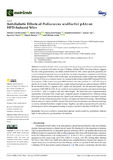Mostrar el registro sencillo del ítem
Antidiabetic effects of Pediococcus acidilactici pA1c on HFD-induced mice
| dc.creator | Cabello Olmo, Miriam | es_ES |
| dc.creator | Oneca, María | es_ES |
| dc.creator | Pajares Villandiego, María Josefa | es_ES |
| dc.creator | Jiménez, Maddalen | es_ES |
| dc.creator | Ayo, Josune | es_ES |
| dc.creator | Encío Martínez, Ignacio | es_ES |
| dc.creator | Barajas Vélez, Miguel Ángel | es_ES |
| dc.creator | Araña Ciordia, Miriam | es_ES |
| dc.date.accessioned | 2022-04-07T07:47:46Z | |
| dc.date.available | 2022-04-07T07:47:46Z | |
| dc.date.issued | 2022 | |
| dc.identifier.issn | 2072-6643 | |
| dc.identifier.uri | https://hdl.handle.net/2454/42680 | |
| dc.description.abstract | Prediabetes (PreD), which is associated with impaired glucose tolerance and fasting blood glucose, is a potential risk factor for type 2 diabetes mellitus (T2D). Growing evidence suggests the role of the gastrointestinal microbiota in both PreD and T2D, which opens the possibility for a novel nutritional approach, based on probiotics, for improving glucose regulation and delaying disease progression of PreD to T2D. In this light, the present study aimed to assess the antidiabetic properties of Pediococcus acidilactici (pA1c) in a murine model of high-fat diet (HFD)-induced T2D. For that purpose, C57BL/6 mice were given HFD enriched with either probiotic (1 × 1010 CFU/day) or placebo for 12 weeks. We determined body weight, fasting blood glucose, glucose tolerance, HOMA-IR and HOMA-β index, C-peptide, GLP-1, leptin, and lipid profile. We also measured hepatic gene expression (G6P, PEPCK, GCK, IL-1β, and IL-6) and examined pancreatic and intestinal histology (% of GLP-1+ cells, % of goblet cells and villus length). We found that pA1c supplementation significantly attenuated body weight gain, mitigated glucose dysregulation by reducing fasting blood glucose levels, glucose tolerance test, leptin levels, and insulin resistance, increased C-peptide and GLP-1 levels, enhanced pancreatic function, and improved intestinal histology. These findings indicate that pA1c improved HFD-induced T2D derived insulin resistance and intestinal histology, as well as protected from body weight increase. Together, our study proposes that pA1c may be a promising new dietary management strategy to improve metabolic disorders in PreD and T2D. | en |
| dc.description.sponsorship | This research was funded by grant from Government of Navarre (Ayudas para la realización de proyectos de I+D 2020) [Reference: 0011-1365-2020-000086]. This study was also funded by grants from Genbioma Aplicaciones S.L. Maria Oneca is supported by Torres-Quevedo grants from the Spanish Ministry of Science and innovation (Ayudas para contratos Torres Quevedo PTQ2019-010384/AEI/10.13039/501100011033). | en |
| dc.format.extent | 21 p. | |
| dc.format.mimetype | application/pdf | en |
| dc.language.iso | eng | en |
| dc.publisher | MDPI | en |
| dc.relation.ispartof | Nutrients, 2022, 14, 692 | en |
| dc.rights | © 2022 by the authors. Licensee MDPI, Basel, Switzerland. This article is an open access article distributed under the terms and conditions of the Creative Commons Attribution (CC BY) license. | es_ES |
| dc.rights.uri | http://creativecommons.org/licenses/by/4.0/ | |
| dc.subject | Diabetes | en |
| dc.subject | Fasting blood glucose | en |
| dc.subject | Gut microbiota and dysbiosis | en |
| dc.subject | High-fat diet | en |
| dc.subject | Insulin sensitivity | en |
| dc.subject | Pediococcus acidilactici | en |
| dc.subject | Prediabetes | en |
| dc.subject | Probiotics | en |
| dc.title | Antidiabetic effects of Pediococcus acidilactici pA1c on HFD-induced mice | en |
| dc.type | info:eu-repo/semantics/article | en |
| dc.type | Artículo / Artikulua | es |
| dc.contributor.department | Ciencias de la Salud | es_ES |
| dc.contributor.department | Osasun Zientziak | eu |
| dc.rights.accessRights | info:eu-repo/semantics/openAccess | en |
| dc.rights.accessRights | Acceso abierto / Sarbide irekia | es |
| dc.identifier.doi | 10.3390/nu14030692 | |
| dc.relation.publisherversion | https://doi.org/10.3390/nu14030692 | |
| dc.type.version | info:eu-repo/semantics/publishedVersion | en |
| dc.type.version | Versión publicada / Argitaratu den bertsioa | es |
| dc.contributor.funder | Gobierno de Navarra / Nafarroako Gobernua, 0011-1365-2020-000086 | es |



